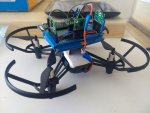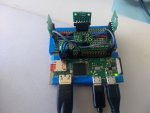

Decided to try to add some sort of distance sensing and control to the Tello; it works pretty well!
The sensor are four VL53L0X sensors ($5 each on eBay) powered and controlled by a Raspberry Pi Zero W ($10).
Here's a video of the Tello moving away from my camera in four dimensions:

Watch VID_20200813_172324965 | Streamable
Watch "VID_20200813_172324965" on Streamable.
streamable.com
More information can be found here:
GitHub - aaaaronlin/tello_collision_avoidance
Contribute to aaaaronlin/tello_collision_avoidance development by creating an account on GitHub.
This is more of a proof-of-concept than an actual usable tool at this point. It would be cool to see others take this project further.
